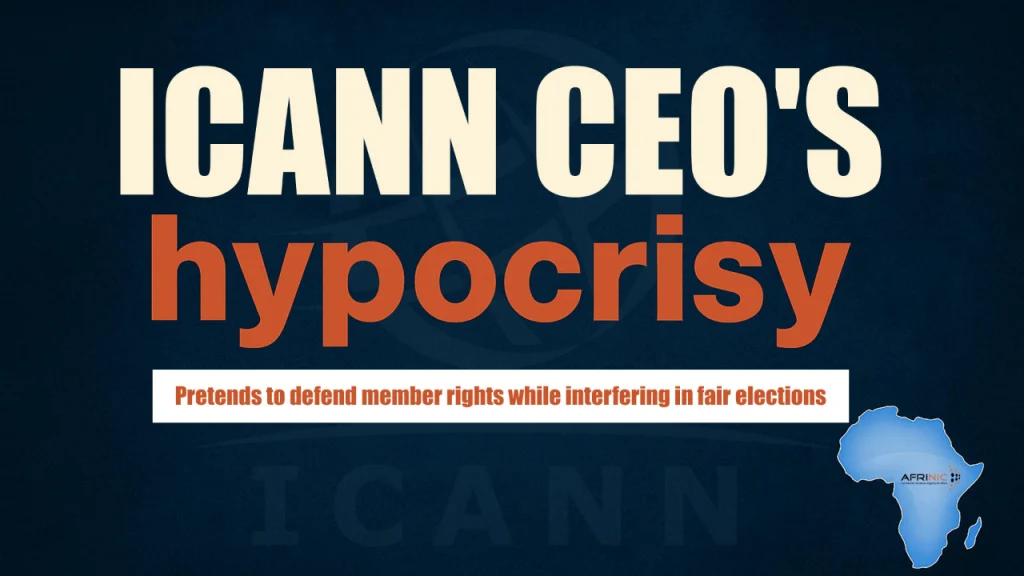- ICANN’s interference in AFRINIC’s elections and its ICP-2 compliance document threaten Africa’s internet governance and autonomy.
- Cloud Innovation calls for reform, pushing for a new RIR to restore trust and transparency in Africa’s digital resource management.
ICANN’s contradictory stance on member rights
ICANN has long presented itself as an organisation committed to protecting member rights and upholding democratic processes in internet governance. However, its actions surrounding the AFRINIC crisis raise significant concerns about its consistency. Despite publicly advocating for the protection of member rights, ICANN’s involvement in AFRINIC’s governance issues suggests a contradiction between its stated values and its practices.
Also read: EXPOSED: The letter that reveals who was really benefitting from AFRINIC’s lawsuits
Intervening in AFRINIC’s election process
A critical moment in the AFRINIC crisis came when the June 23, 2023, election was annulled over a dispute regarding a single proxy vote. While the election was overseen by a court-appointed Official Receiver, ICANN’s subsequent action indicate an effort to influence the internal processes of the organisation. Although ICANN’s involvement was framed as an attempt to “ensure governance standards,” its intervention has been seen by some as overreaching, especially given the complexities surrounding AFRINIC’s internal election disputes.
Also read: ICANN’s letter to AFRINIC: Fair election oversight or a blow to African self-governance?
The role of ICP-2 and governance overreach
ICANN’s introduction of the ICP-2 compliance document has further sparked concerns about its role in internet governance, particularly regarding regional internet registries (RIRs). The document lays out compliance measures that some see as giving ICANN too much control over the management of IP addresses, potentially undermining the autonomy of regional bodies like AFRINIC. Critics argue that ICANN bypassed its own multistakeholder processes to push through these changes, raising questions about the transparency of its decision-making and its true motivations behind these governance shifts.
Also read: As ICANN threatens to ‘review’ AFRINIC, an elected board is its only hope for survival
Erosion of Africa’s bottom-up internet governance
Africa’s internet governance model has historically been based on a bottom-up approach, with regional stakeholders having significant input in decision-making processes. However, ICANN’s involvement in AFRINIC’s leadership challenges has raised concerns about external interference that could weaken Africa’s autonomy in managing its internet infrastructure. These interventions, while framed as necessary reforms, may undermine the very principles of regional self-governance that the African internet community has worked to establish.
Cloud innovation’s call for reform
In light of AFRINIC’s governance struggles, Cloud Innovation Ltd., one of the organisation’s largest members, has called for a fresh start for the African registry. Cloud Innovation’s call for reform, including a potential wind-up of AFRINIC, reflects their belief that the current governance model has reached an impasse. The company advocates for a new RIR to be appointed to ensure the continuity and fairness of Africa’s IP management. While their stance is controversial, it underscores the need for a transparent, stable system that can guarantee effective management of Africa’s digital resources.
ICANN’s influence on regional internet governance
ICANN’s interventions in AFRINIC’s crisis suggest a more active role in shaping the future of regional internet governance, but it raises the question of whether such involvement risks undermining the autonomy of regional organisations. While ICANN may claim to act in the best interest of global internet governance, its influence on AFRINIC’s operations look like a power grab, raising concerns about the balance of control in the global internet ecosystem.
The need for transparent, localised governance
The future of Africa’s digital resources depends on ensuring that governance remains transparent, accountable, and truly representative of local stakeholders. It is crucial that Africa retains control over its own IP resources and avoids external interference that undermines regional autonomy. A reset in AFRINIC’s governance structure, as advocated by Cloud Innovation, could serve as an opportunity to address long-standing issues and rebuild trust within the African internet community.

